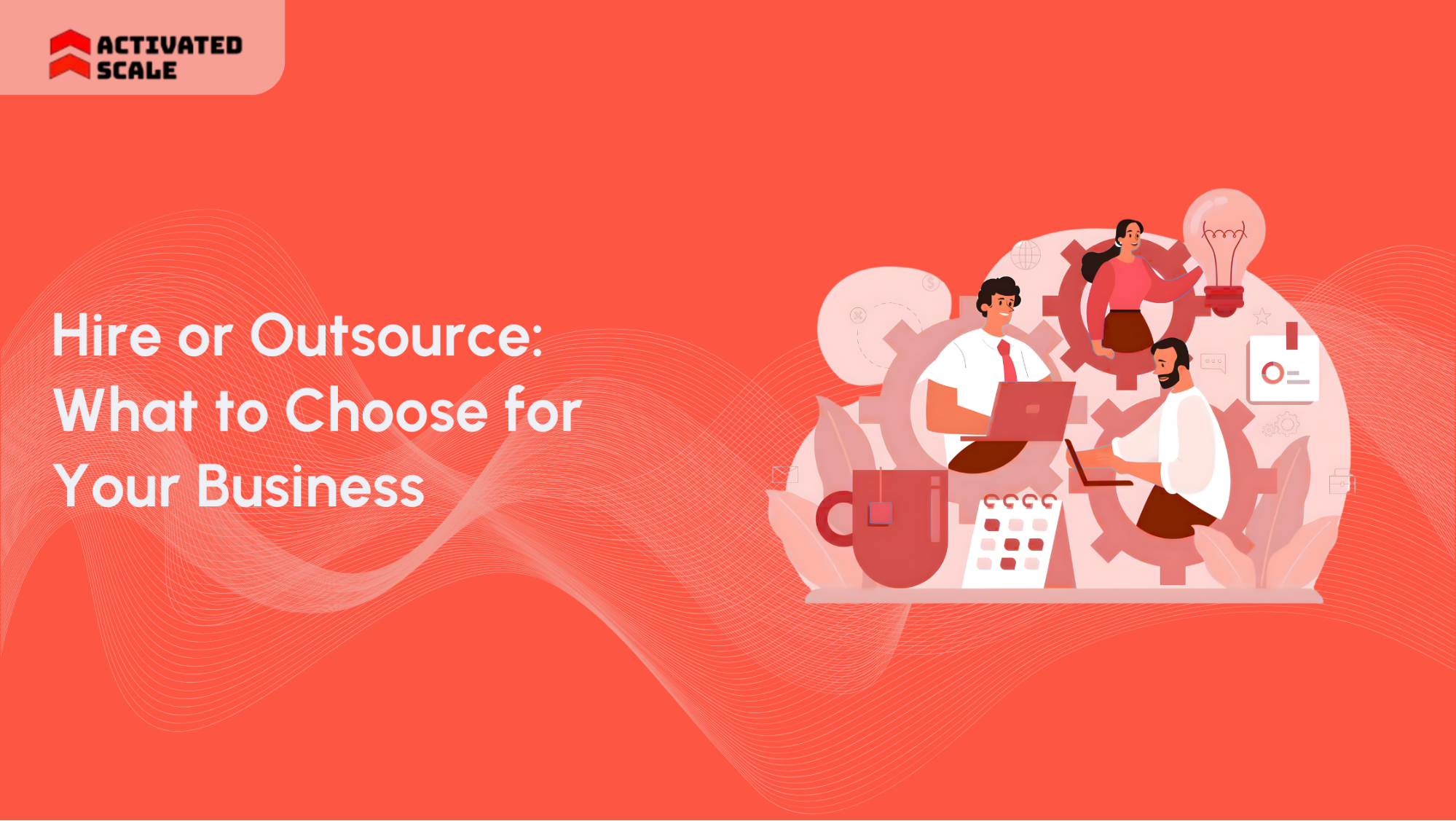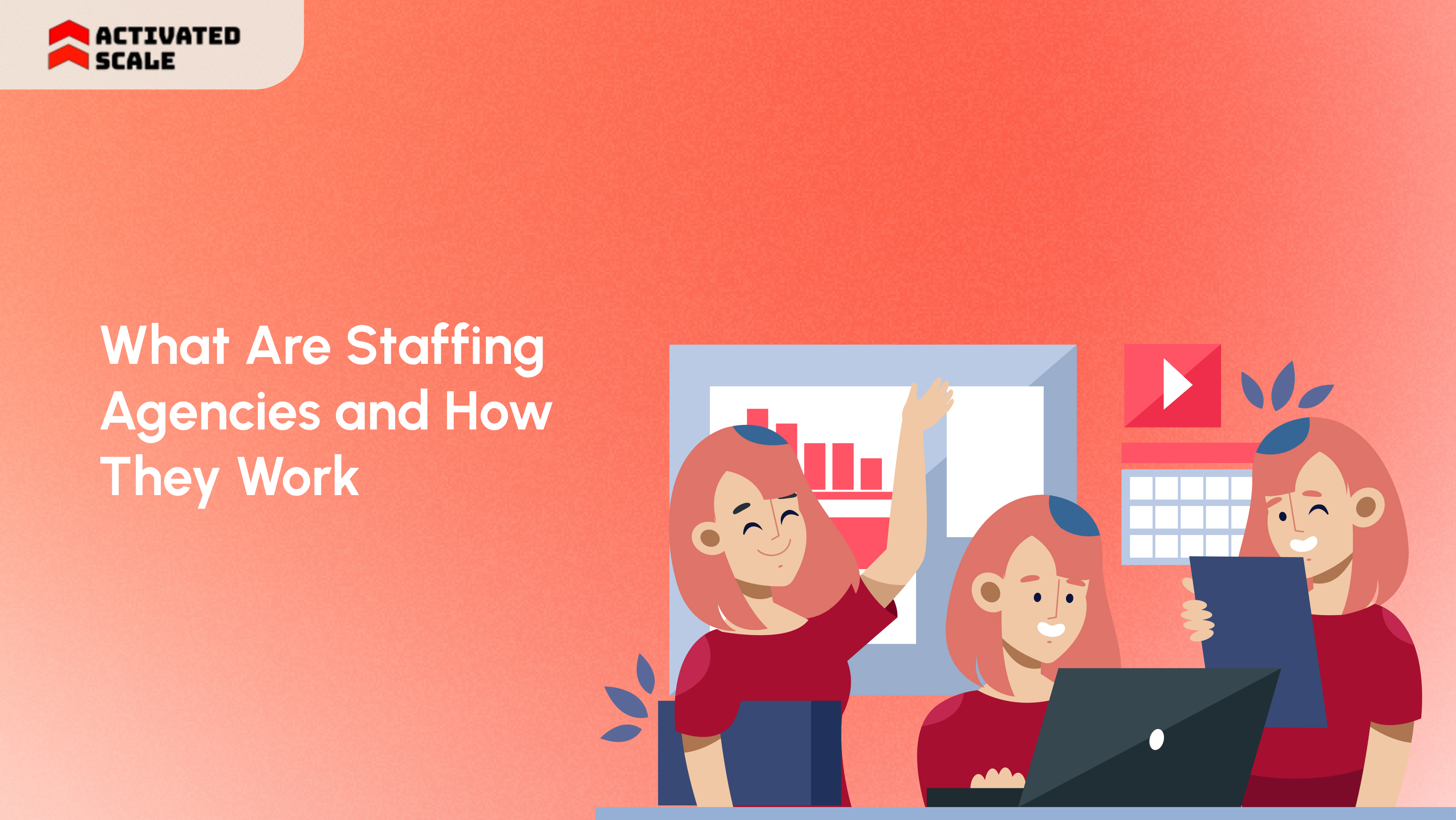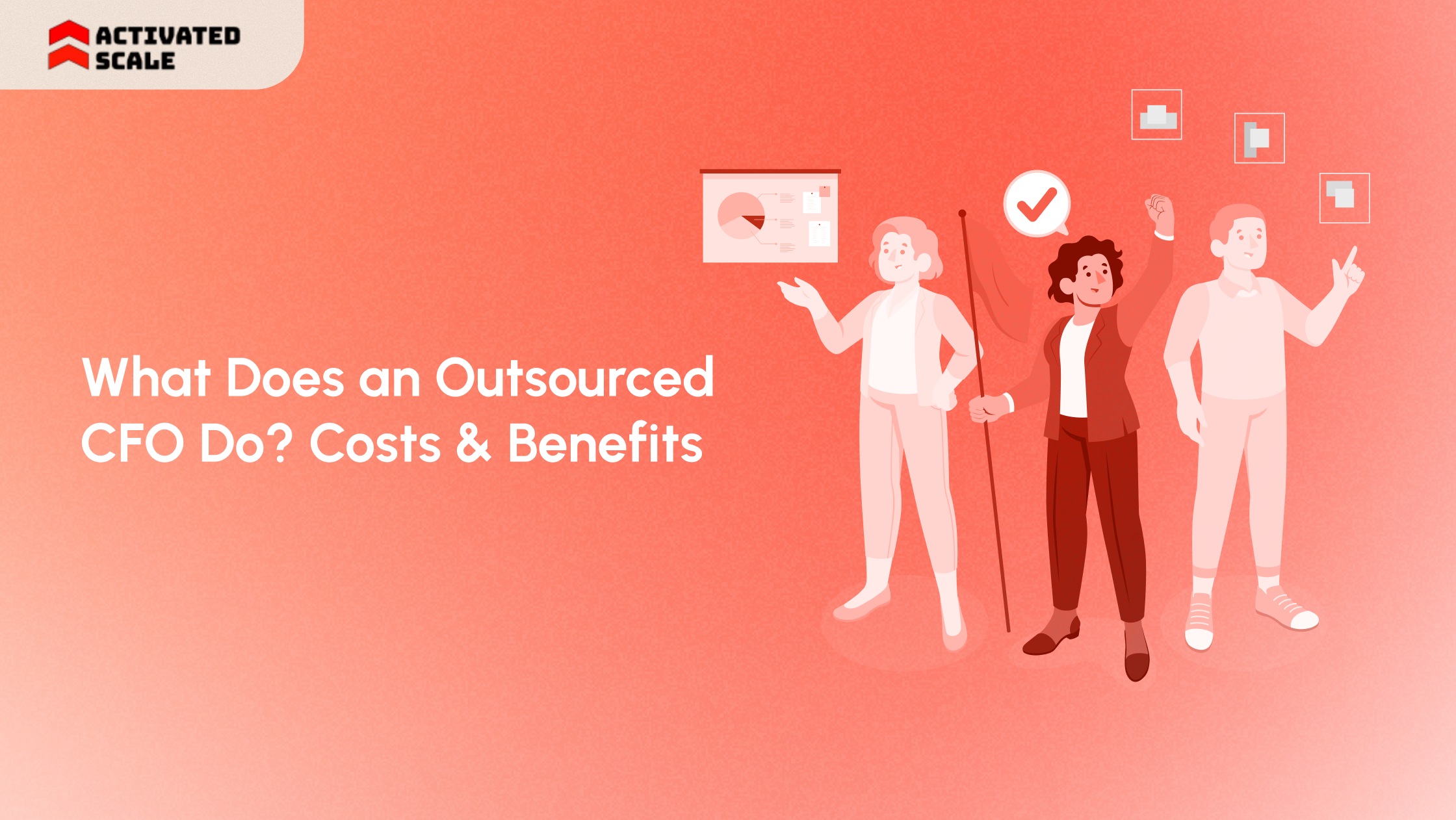For sales leaders and enterprise teams, making the right staffing decision is crucial. When weighing whether to hire or outsource, several factors come into play. You’ll need to assess everything from cost-effectiveness to strategic goals.
U.S. job growth slowed in August, with the economy adding 22,000 jobs, the lowest figure so far in 2025. So, should you stop hiring? As the global outsourced sales services market is projected to reach $3.96 billion by 2034, businesses will have more resources to outsource.
Now, what should be your choice? Should you stop hiring full-time even though they are better for long-term growth? In this blog, we’ll help you find clear insights on when it makes sense to bring in-house talent versus using external expertise.
Quick Glance
- Outsourcing provides flexibility, cost savings, and access to expertise for short-term or specialized tasks.
- In-house hiring offers control, loyalty, and long-term commitment for core functions.
- Outsourcing is ideal when you need to quickly scale or fill expertise gaps without long-term commitments.
- In-house hiring is best when you require full control over operations and a dedicated team aligned with company culture.
- Activated Scale offers Contract-to-Hire Sales Recruiting, Fractional Selling, and Fractional Sales Leadership to help you scale without full-time overhead.
The Essentials of Outsourcing vs. In-House Hiring: What You Need to Know
You can't build a winning strategy on a weak foundation. Confusion over the basic mechanics of in-house teams versus outsourced partners leads to costly missteps. Here, we ensure you have the clarity to evaluate them fairly:
1. Outsourcing
This involves bringing in external parties, such as freelancers, agencies, contractors, or suppliers, to handle certain tasks or functions. This approach is common for functions that don’t need to be managed by a permanent, in-house team.
Common areas outsourced include:
- IT services (database management, data storage)
- Accounting (bookkeeping, payroll)
- Recruitment
- Marketing (SEO, content writing)
- Design and creative work
- Website design, development, and management
- Customer support services
- Product manufacturing
- Distribution and shipping
2. In-House Hiring
Hiring in-house employees means bringing on full-time or part-time staff to work directly within your company. This is ideal for core business functions that require long-term commitment and integration with your company culture.
Core functions to consider keeping in-house include:
- Product development or tech innovation
- Business strategy and leadership
- Brand management and key partnerships
So, with the "what" clearly defined, how do you handle the "when"? The decision to build in-house or partner externally isn't arbitrary.
It hinges on a clear-eyed assessment of your current challenges and strategic ambitions.
Read Also: Top Global Sales Outsourcing Trends Shaping 2025
What are the Key Considerations for Choosing Between Outsourcing and Hiring?
Are you dealing with a short-term project that requires quick results? Do you need someone with specialized expertise your team lacks?
Or are you building a long-term team culture with a focus on core business functions? These are just some of the questions that can help guide your decision.
When to Outsource?
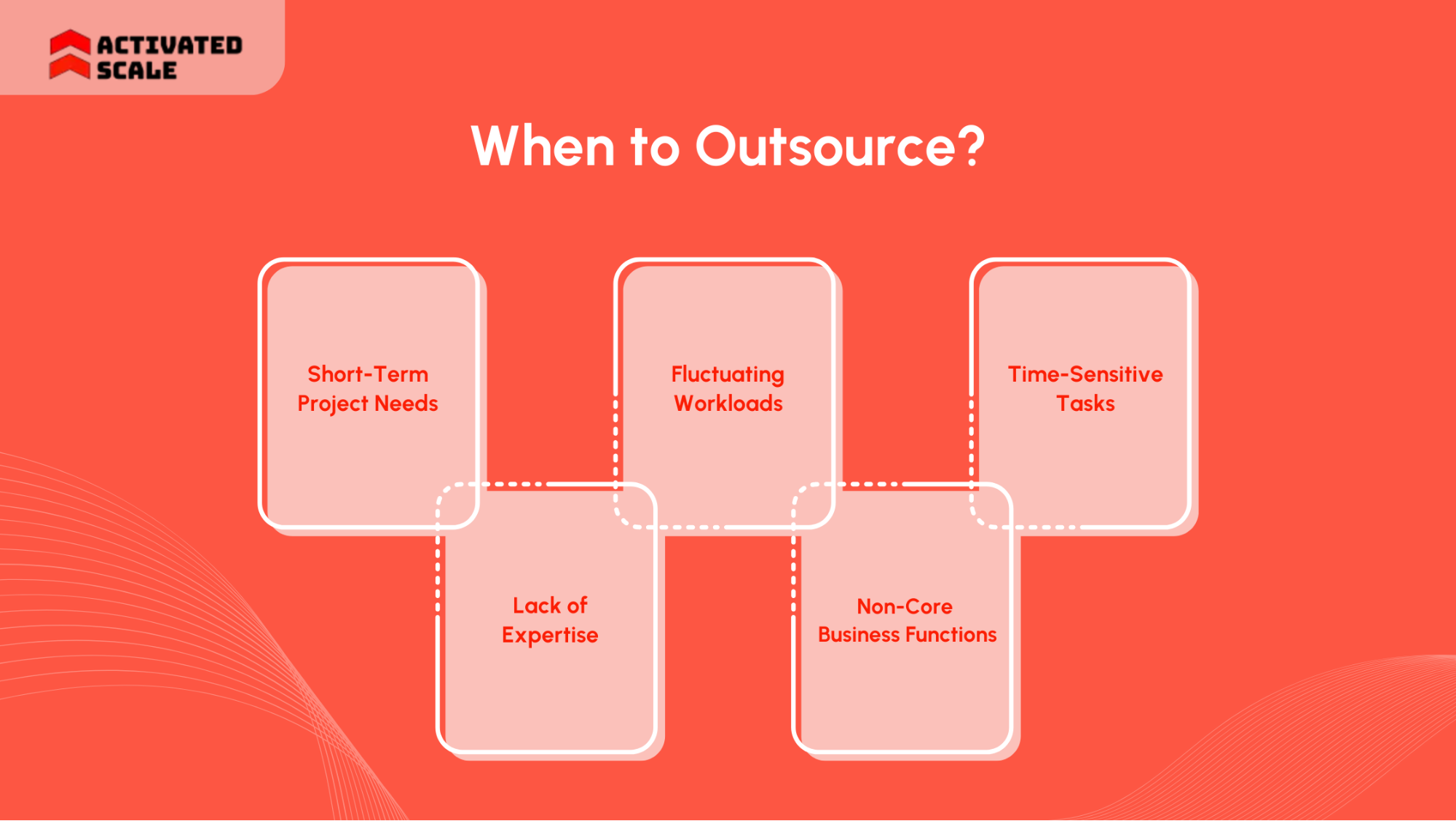
Curious about when outsourcing is the right choice? Here are a few scenarios where outsourcing can really shine:
- Short-Term Project Needs: If you have a one-off task or a time-sensitive project, outsourcing provides a quick, efficient solution. You can bring in experts for the duration of the project without the long-term commitment of hiring a full-time employee.
- Lack of Expertise or Knowledge Gaps: Sometimes, your team simply doesn’t have the right skill set. Rather than spending time training someone in-house, you can outsource to specialists who can deliver quality work with minimal ramp-up time.
- Scalability or Fluctuating Workloads: Is your business experiencing peaks and valleys in demand? Outsourcing offers instant scalability, freeing your operations up or down without the overhead of a permanent full-time team.
- Non-Core Business Functions: Think about areas of your business that aren’t critical to your main goals. Customer service, bookkeeping, or marketing, these are all functions that can often be outsourced, leaving you to focus on what you do best.
- Time-Sensitive Tasks: When deadlines are tight, outsourcing can help you get things done quickly. Outsourcing allows you to meet timelines without compromising on quality.
When to Hire In-House?

But what about when you need to bring someone on full-time? Here are the moments when hiring in-house might be the smarter choice:
- Core Business Functions: If the role is central to your company’s competitive advantage, like product development or strategy, it’s better to bring it in-house. You need someone who understands your vision and can stay aligned with your company’s evolving goals.
- Confidential or Sensitive Information: Protecting company secrets or handling sensitive data requires a level of trust and control that external partners simply can’t offer. For these critical functions, in-house staff provide that level of oversight.
- Long-Term Commitment Needed: In-house employees are more likely to invest themselves in the long-term success of the company. When you need a stable, committed team to build and grow over time, hiring full-time employees is the best route.
- Building a Dedicated Team Culture: If building a cohesive, company-centric culture is essential to your business success, hiring in-house employees ensures they are part of the team.
- Strategic Roles Requiring Company-Specific Knowledge: Certain positions demand deep knowledge of your company’s unique processes, products, or services. Hiring in-house allows you to find talent who can fully integrate into the team and contribute to your long-term strategy.
As you weigh the decision between outsourcing and hiring in-house, consider the support Activated Scale can provide your business right now. If you're unsure about making a full-time hire just yet, Fractional Sales Leadership might be the perfect fit for you.
While choosing the right model for a single role is one thing, scaling a team requires a more nuanced approach. The goal is to create a cohesive unit that leverages the best of both worlds.
How to Balance In-House Hiring and Outsourcing?
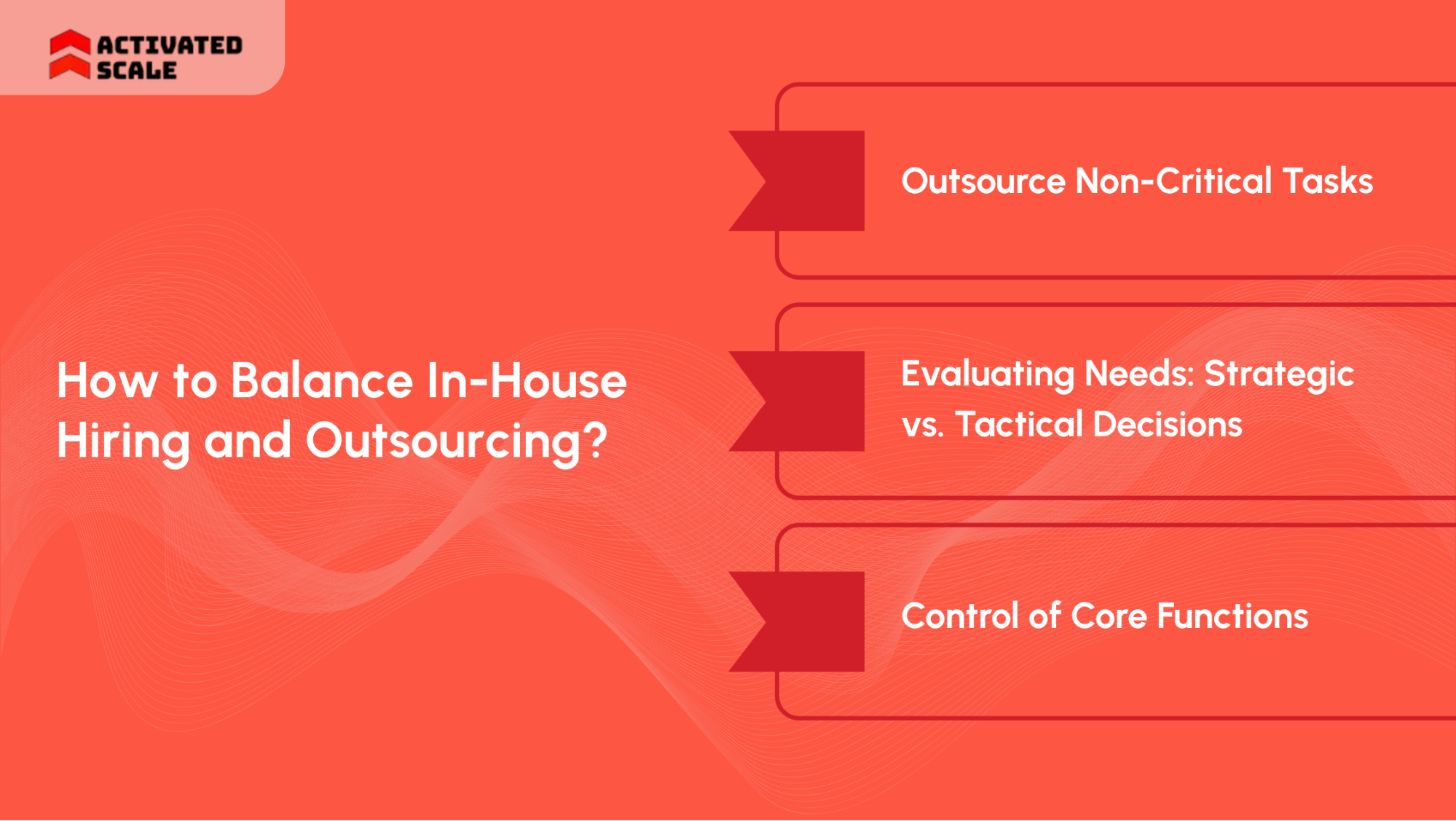
Achieving the right balance between in-house hiring and outsourcing isn’t always easy. It’s about knowing when to trust your internal team to handle critical tasks and when it makes more sense to turn to external providers.
Let’s understand how you can find this balance for your business:
1. Outsource Non-Critical Tasks
While core functions deserve your full attention, non-critical tasks are perfect candidates for outsourcing. These are functions that don’t directly affect your business’s unique value proposition, but they’re still essential for smooth operations.
Outsourcing these tasks allows you to access expertise and manage costs more effectively. For instance, a small business might outsource social media management or customer service to experts who specialize in those areas.
2. Evaluating Needs: Strategic vs. Tactical Decisions
Knowing which areas of your business require long-term investment and which can be outsourced is crucial. A strategic approach to staffing helps ensure that you don’t overextend your budget or sacrifice quality in areas that truly matter.
Consider both risks and benefits when deciding:
- Core activities (those with high strategic value) should remain in-house.
- Tactical functions (those with more operational importance than strategic) can be outsourced to increase flexibility.
3. Control of Core Functions
Some functions are simply too critical to your business’s success to leave in the hands of external providers. These are your core functions. You’ll want to keep these in-house, where you can maintain full control and ensure consistency in quality.
“You don’t want to outsource anything that is part of your core business,” said Power Home Remodeling COO Tim Wenhold.
So, which model delivers the outcomes that matter most to you? To answer that, we need to move beyond pros and cons and understand both in a real-world performance.
Also Read: Why You Should Hire Fractional Sales Talent
Advantages and Disadvantages of Outsourcing vs. Hiring
As you decide whether to hire or outsource, understanding the advantages and disadvantages of each option is crucial. Both choices have their strengths, but choosing the right one for your business will depend on what you value most: Flexibility, control, or long-term commitment.
Here's a quick table of pros and cons you will need to know:
If you're considering outsourcing, Fractional Selling from Activated Scale can be the perfect solution to help you scale quickly without hiring a full-time team. Our experienced fractional VPs of Sales can guide your sales strategies and organize your sales processes.
Now, which option makes the most cents? It's time to move from qualitative benefits to a quantitative comparison, breaking down the real financial impact of each model.
What’s the Best Financial Move for Your Business?
You're not just choosing a team structure; you're making a critical investment decision. Do you invest in building a permanent team (in-house) or pay for an unmatchable expertise (outsourcing) when you need it?
The best financial move depends on your destination, your roadmap, and how efficiently you need to travel:
You've decided to bring on a specialist or hire someone full-time. But what will be the right procedure for moving forward?
Also Read: B2B Sales Techniques for Success
How to Identify the Right Outsourcing Partner or In-House Team?
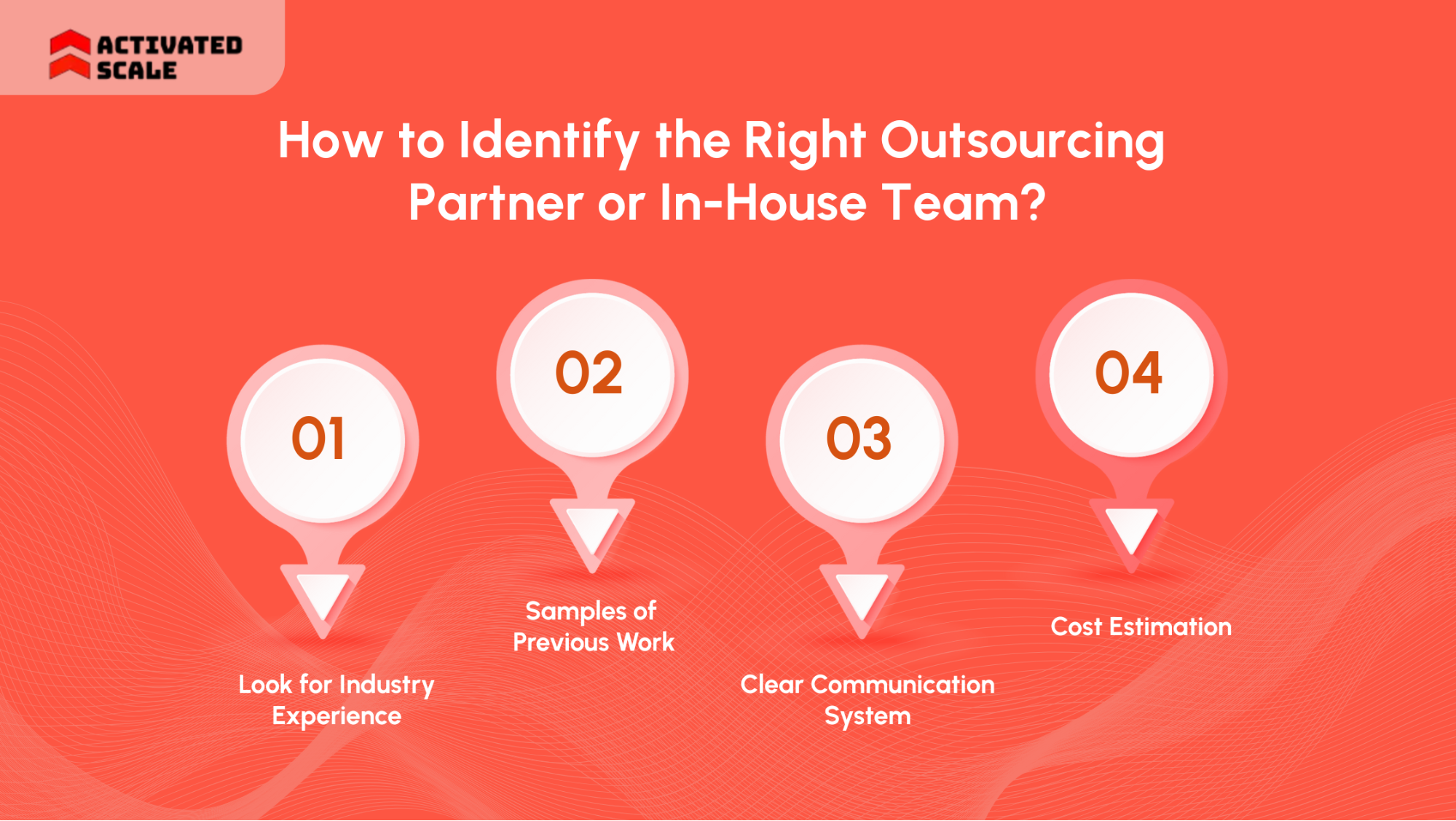
A great outsourcing decision can be undone by a flawed hiring process. How do you move from a stack of proposals to a trusted, high-performing partner? The answer lies in a structured approach that evaluates cost and skills, communication, security, and shared vision.
Here's how to ensure you select the best outsourcing partner for your needs:
- Look for Industry Experience, Technical Expertise, and Proven Track Record: Your outsourcing partner should have a deep understanding of the industry and the specific task at hand. Look for partners who have successfully completed projects similar to yours.
- Client References and Samples of Previous Work: Reliable providers should be willing to share this information. Reviewing their past projects or even speaking directly with past clients can give you valuable insight into their quality of work.
- Clear Communication System and Project Management Structure: Effective communication is key to successful outsourcing relationships. Ensure that the provider has a structured approach to managing projects and clear channels of communication.
- Cost Estimation: Discuss the cost structure upfront to avoid any surprises later. For projects with a clear scope, fixed fees can work well. However, for tasks with variable workload, you might prefer hourly or fluctuating rates.
Selecting the Right Fit for In-House Roles:
Recruiting in-house talent involves more than just posting job ads. You’ll need a process for sourcing, interviewing, and evaluating candidates.
Focus on attracting individuals who have the right skills and also align with your company’s vision and values. Offering a clear career growth path can help attract top talent for strategic roles.
If you’re looking for the flexibility to scale your sales efforts, the Contract-to-Hire Sales Recruiting service from Activated Scale is the perfect solution.
How Activated Scale Can Help You Make the Right Hiring Decision?
Your talent strategy shouldn't be a rigid choice but a flexible advantage. At Activated Scale, we provide personalized staffing models that fit your unique objectives.
Here’s how we can support you in your staffing decisions:
1. Contract-to-Hire Sales Recruiting
If you're uncertain about committing to a full-time hire, Contract-to-Hire Sales Recruiting allows you to evaluate potential employees on a flexible, trial basis. This way, you can test their skills and cultural fit before making a long-term commitment. It’s a smart way to ensure you hire the right sales professionals without the immediate full-time cost or risk.
2. Fractional Selling
Need experienced sales support but don't have the bandwidth for a full-time hire? With Fractional Selling, you can access skilled SDRs (Sales Development Representatives) and AEs (Account Executives) to fill gaps in your sales team without the long-term commitment.
This model is perfect for businesses needing short-term support.
3. Fractional Sales Leadership
For organizations needing to bring on a full-time VP of Sales, our Fractional Sales Leadership service provides experienced leadership. A Fractional VP of Sales will help you create sales playbooks and set up partnership programs, all on a flexible, part-time basis.
These flexible solutions are designed to support your business’s unique needs, allowing you to scale sales in a flexible way.
Also Read: Tips for Hiring a Sales Director for Your Top-Performing Team
Final Thoughts
So, hire or outsource? The modern business demands agility. The question is no longer if you should outsource or hire in-house, but how to strategically blend both to build a resilient, results-driven team.
If you are still thinking about hiring or outsourcing, then align your talent strategy with specific goals. In this way, you can convert a tactical dilemma into a business advantage.
Ready to build your agile workforce? Book a Demo with Activated Scale to design a custom staffing solution that drives growth.
FAQs
1. When is outsourcing better than hiring in-house?
Outsourcing is ideal for short-term projects, specialized skills, and when you need to scale quickly without long-term commitment.
2. What are the biggest benefits of hiring in-house employees?
In-house employees provide greater control over work quality, strong cultural alignment, and long-term commitment.
3. How does Fractional Sales Leadership work?
Fractional Sales Leadership provides experienced leadership on a part-time basis, allowing you to build strategies and grow sales without the overhead of a full-time hire.
4. What industries benefit the most from outsourcing?
Industries like IT, marketing, customer service, and finance often benefit from outsourcing specialized tasks or roles.
The Ultimate Guide to Hiring a Salesperson!
Get the step-by-step guide to hiring, onboarding, and ensuring success!
_edi.png)
